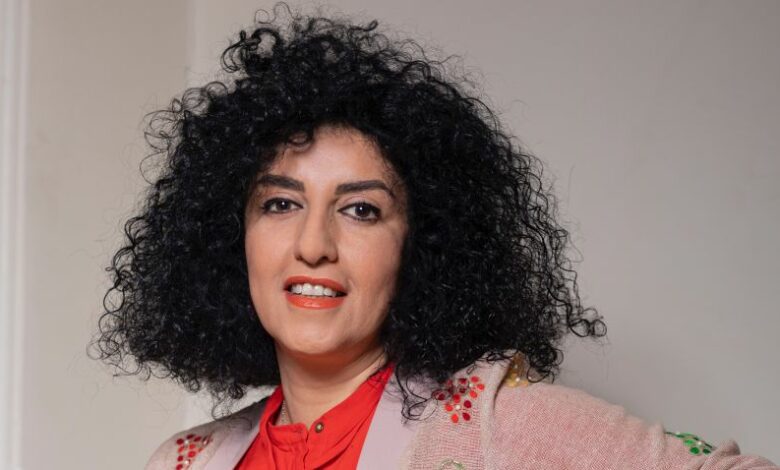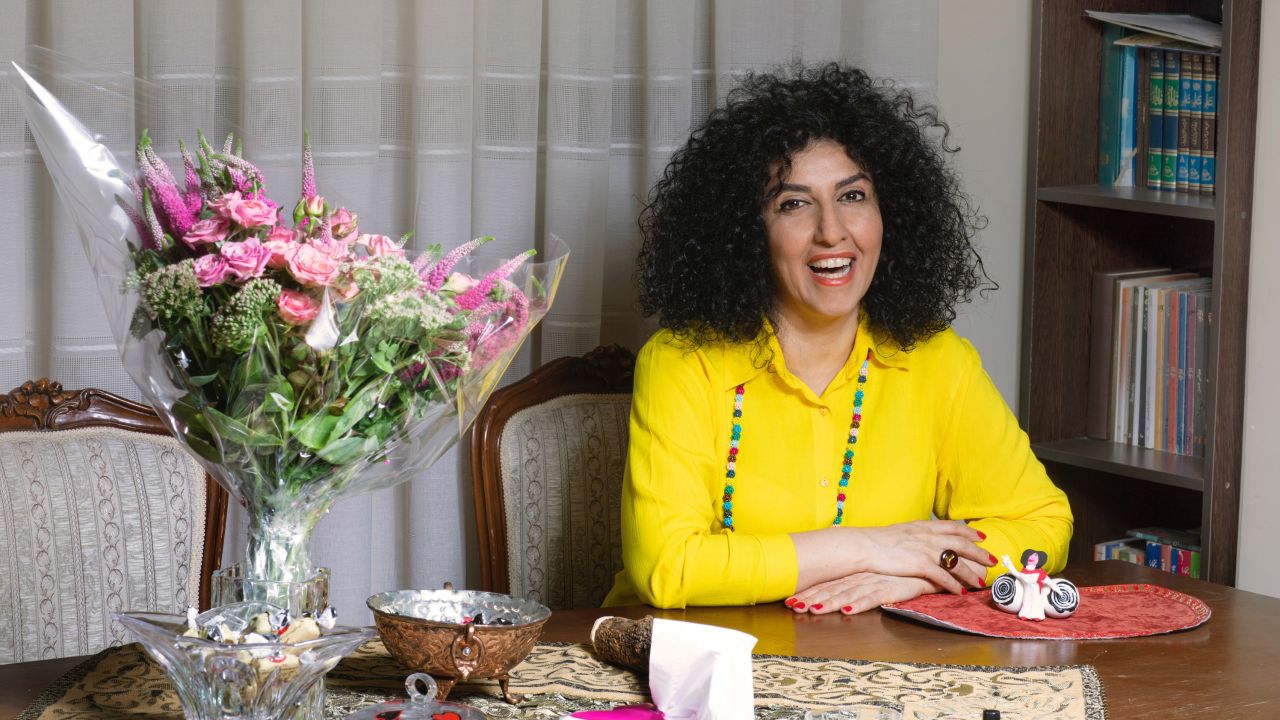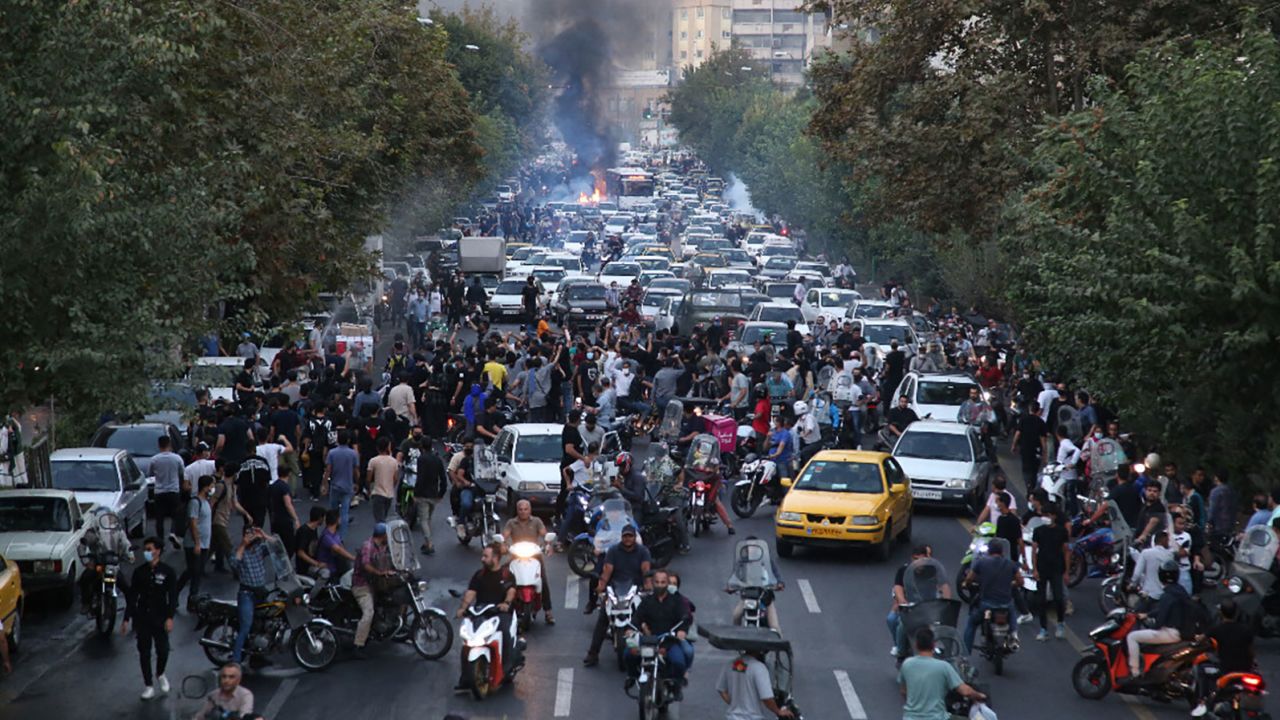
Mohammadi’s name has become synonymous with the fight for human rights in Iran – a battle that has cost her almost everything.
“Altogether, the regime has arrested her 13 times, convicted her five times, and sentenced her to a total of 31 years in prison, and 154 lashes,” Norwegian Nobel Committee chair Berit Reiss-Andersen said at the announcement ceremony.
Mohammadi, 51, has been sentenced to more than 30 years in jail, and has been banned from seeing her husband and children.
“Ms. Mohammadi is still in prison as I speak,” Reiss-Andersen added.
But not even the dark cells of Tehran’s notorious Evin Prison have crushed her powerful voice.
In an audio recording from inside Evin, shared with CNN ahead of Friday’s announcement, Mohammadi, is heard leading the chants of “woman, life, freedom” – the slogan of the uprising sparked last year by the death of 22-year-old Mahsa Amini in the custody of the country’s morality police. Amini was arrested for allegedly not wearing her headscarf properly.
The recording is interrupted by a brief automated message – “This is a phone call from Evin Prison” – as the women are heard singing a Farsi rendition of “Bella Ciao,” the 19th-century Italian folk song that became a resistance anthem against fascism and has been adopted by Iran’s freedom movement.
“This period was and still is the era of greatest protest in this prison,” Mohammadi told CNN in written responses to questions submitted through intermediaries.

‘Woman, life, freedom’
Henrik Urdal, director of the Peace Research Institute Oslo, described Mohammadi’s win as “a tremendous achievement for women’s rights in Iran.”
“Women in the country have been fighting for equality and freedom for generations, and the death of Mahsa Amini became a catalyst against oppression and violence,” Urdal said in a statement to CNN.
“Today’s laureate, unfairly jailed in Tehran, sends a powerful message to the leaders of Iran that women’s rights are fundamental everywhere in the world,” he said.
Mohammadi’s recognition comes after a year of huge upheaval in Iran, sparked by the death of Amini, which swelled into nationwide protests lasting months.
Reiss-Andersen described the unrest as “the largest political demonstrations against Iran’s theocratic regime since it came to power in 1979.”
They were met by a brutal government crackdown. “More than 500 demonstrators were killed. Thousands were injured, including many who were blinded by rubber bullets fired by the police. At least 20,000 people were arrested and held in custody,” Reiss-Andersen said.
Last month marked the one-year anniversary of Amini’s death. Video obtained by CNN showed further demonstrations throughout multiple cities in Iran, including capital Tehran, Mashad, Ahvaz, Lahijan, Arak and the Kurdish city of Senandaj.
Many of the protesters shouted “Woman, Life, Freedom,” and others chanted slogans against Iranian Supreme Leader Ali Khamenei.

The long road to the Nobel
Mohammadi, who studied for a degree in physics at Imam Khomeini International University in the 1990s, initially worked as an engineer, while writing columns for reformist Iranian newspapers, Berit Reiss-Andersen said at Friday’s news conference.
In 2003, she joined the Defenders of Human Rights Center in Iran, an organization founded by the Nobel Peace Prize laureate Shirin Ebadi.
Mohammadi was arrested for the first time in 2011 and convicted in part because of her membership of the Defenders of Human Rights Center. After being released on bail two years later, Mohammadi began to campaign against the use of the death penalty.
“Iran has long been among the countries that execute the highest proportion of their inhabitants annually,” the committee acknowledged. Since January last year, more than 860 prisoners have been punished by death in the country.
For her activism against capital punishment, Mohammadi was arrested and sentenced again in 2015. But her activism continued from inside Evin Prison, as she began to oppose human rights abuses committed against political prisoners.
CNN reported last year on how Iran’s security forces used rape to quell the protests that broke out after the death of Amini.
With media access inside Iran severely constrained, CNN went to the region near Iraq’s border with Iran, interviewing eyewitnesses who had left the country and verifying accounts from survivors and sources both in and outside Iran, to corroborate several reports of sexual violence against protesters.
One Kurdish-Iranian woman, whom CNN is calling Hana for her safety, says she both witnessed and suffered sexual violence while detained. “There were girls who were sexually assaulted and then transferred to other cities,” she said.
Iranian officials did not respond to CNN’s request for comment on the alleged abuses.
‘Preconditions for lasting peace’
In awarding the prize to Mohammadi, the Nobel Committee said it also “recognizes the hundreds of thousands of people who in the preceding year have demonstrated against the theocratic regimes’ policies of discrimination and oppression targeting women.”
“Only by embracing equal rights for all can the world achieve the fraternity between nations that Alfred Nobel sought to promote,” Reiss-Andersen added.
“The award to Narges Mohammadi follows a long tradition in which the Norwegian Nobel Committee has awarded the Peace Prize to those working to advance social justice, human rights and democracy. These are important preconditions for lasting peace.”




